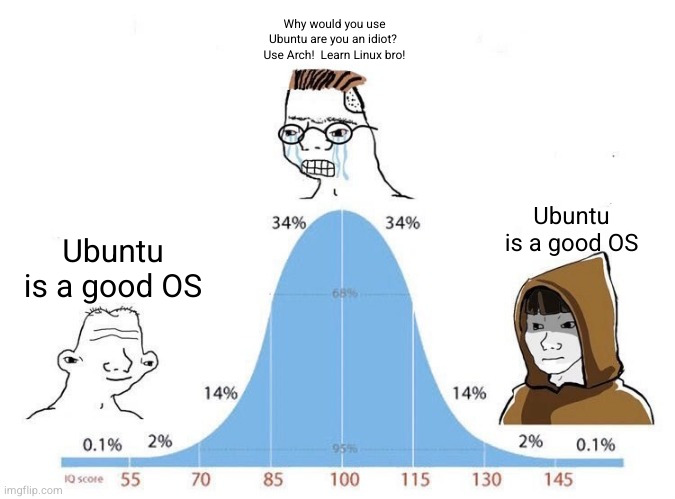Alt text: A line plot with 2 axis (confidence vs competence) referencing the Dunning-Kruger effect with various distro logos placed at different points on the line. Starts with mint/ubuntu near (0,0) and progressing through multiple distros to end up with opensuse/fedora at what it calls “the plateau of sustainability”
I assume Hannah Montana Linux is off the chart to the right
Hannah Montana Linux, or HM/Linux as I’ve taken to calling it, is the sign of true civilization.
Users often achieve enlightenment and can simultaneously interact with many planes of existence - that just can’t be shown on a 2D chart for us plebs.
deleted by creator
Starting fights today are we?
Gotta dig in early before the pesky Americans wake up
Brother you posted this at the Americans’ lunch time (or second breakfast for the pacific coasters) ?? They were already arguing and here you come with petrol and a lit match
Mint, and I’ll stay with mint. Perhaps I’m not a good Linux user material, but I just want something that works and doesn’t get into the way. You know: a reliable, unobtrusive operating system.
And there’s no shame in that! Use whatever works for you and don’t let anyone tell you otherwise.
There is SO MUCH shame in that, the pitiful noob wont even learn to RTFM, and then I’ll have no way to feel superior to them as I dip my beard into my off brand morning cereal #frostedfakes
Same here. I started with mint 10 years ago, fucked around and came back to it.
Not a Dev, but I work in tech, so it does most of the things I want and can tinker with nascent projects without blowing my foot off.
Using mint doesn’t mean you’re bad at Linux using arch doesn’t mean you’re good at it.
Mint is the start and the end for a lot of people for good reason.
I like it because when I have an issue, the ones for Ubuntu and Debian also work.
Same here, played around, but mint keeps pulling me back in. 10+ years going strong
Mint is fine. If you love it, there’s no reason to leave. Personally, I’m a fan of KDE and I strongly dislike the retro-Windows feel of Cinnamon so I settled on Fedora after Mint dumped its KDE edition.
I want to see a graph where X ranges from “ambitious” to “I’m so tired”, and Mint is at the end. That’s where I’m at.
Same. Mint was at the start too, though.
tried a few distros before mint because i thought it was less cool or whatever, but then it was the only one i could get working. every few months i try something else and come crying back…
Linux experts vastly overestimate the amount of annoyance average people will put up with. Most people just want it to work, and want to learn almost nothing. I don’t blame them, Linux is a means to an end.
Ragebait
🫡
Servers = Debian
Desktop/Laptop = ArchRemoved by mod
My guess before reading the comments:
“Everyone hated that.”
Oh fuck of with this bullshit. This is why linux is not on more PCs, this distro elitism.
You’re on linuxmemes not Year of the Linux Desktop memes.
I prefer my memes with less smug condescending bullshit. But hey I am sure this sort of thing helps validate you, so go wacky.
I feel neither validated nor invalidated by the meme because its an image on the internet portraying a joke. I don’t think someone posting a meme in a community called Linux memes needs to be held to this holier than thou status. I don’t inherently agree with the meme myself, but I’m not going to sit here and get butthurt about an obvious in joke posted to that in group.
well they got arch correct.
i use arch btw.
Arch Enjoyers

A screenshot of Hellraiser, with Pinhead saying in caption “We have such sights to show you.”
Urgh, at least this helps my point.
It’s a meme sub though
100% agree, just more rage bait fuel for the fire
FIFY

!unix_surrealism@lemmy.sdf.org is leaking.
Debian is love. Debian is life.

Canonical: snap snap snap snap snap snap snap snap snap
What’s the issue with snaps? I’m still on Ubuntu ans abkut to switch to Debian, but for me its pretty chill atm because I don’t have to worry about updates or security. I know about the terminal aliases, which could be disclosed better, but it’s not that big of a deal to me. I thought it’s pretty cool to have a “store” that’s curated so I don’t have to worry about security, since I use Linux casually.
I’ll just repost this repost of my personal experience then:
Here’s my answer to this same question from an old thread on Reddit:
My Ubuntu system always reserved a whopping 20% of my 32GB ram for no reason and I never bothered to know why. Later I uninstalled snapd because of boot time issues and guess what happened? Only 1.5 GB used after a fresh boot.
I had like 4 different JetBrains IDEs installed via snap with each totalling around 2GB of disk space. While removing snapd I discovered it kept back 2-3 previous versions of every package on your disk.
Uninstalling this bloat was the best thing I did to my ubuntu system. It was suddenly light as a feather and way more responsive like I just did a fresh system install.
Some time later I was installing something from apt and Ubuntu tried to install it from snap, thus sneakily installing snapd in the process. Looking for a solution, I felt like I was looking up how to disable Windows updates or some other shit.
I had a moment of clarity and wondered why the fuck did I have to put up with this kinda bullshit on Linux. I wiped that drive clean and switched to Fedora.
Edit: and there’s also flatpak which-despite being awful in some ways-is better than snap in every conceivable way.
Thank you for clarifying that!
The Fedora propaganda is getting annoying.
It’s linuxmemes, you get the choice between that and debian propaganda.
I’ve always had issues with fedora and nvidia.
Same here…every time I get an update, my nvidia card stops working! And every time seems like the fix is different. I’ve been using fedora for 3 years straight now and gaming with my crappy nvidia card is awful.
Confidence on a Dunning-Kruger chart is not a good thing.
I don’t really care about others but please avoid Manjaro they had some shady finances and apparently don’t manage their certs correctly
Ubuntu and Mint need to be repeated on the far right (the actual Sesame Street definition of “right”, not Nazis)
Seriously. I feel like the people I know who know the most about computing have the least preferences for a distro, if they even use Linux at all.
deleted by creator
And I’m talking about the wide spectrum of computing related topics beyond operating systems - from lithography to abstract research topics to data center architecture, all of whom are experts in their field.
Agreed. Why should I have the “least (presumed) competence” when I’m using one of the 2 things on here that works every single day?
Full circle, back to Mint










